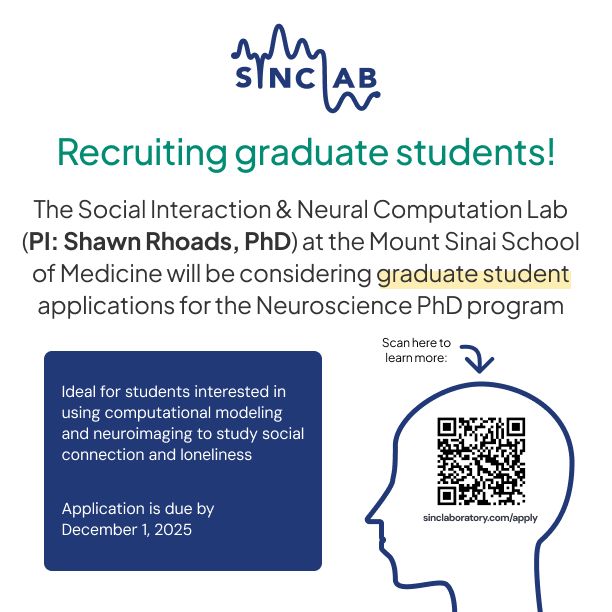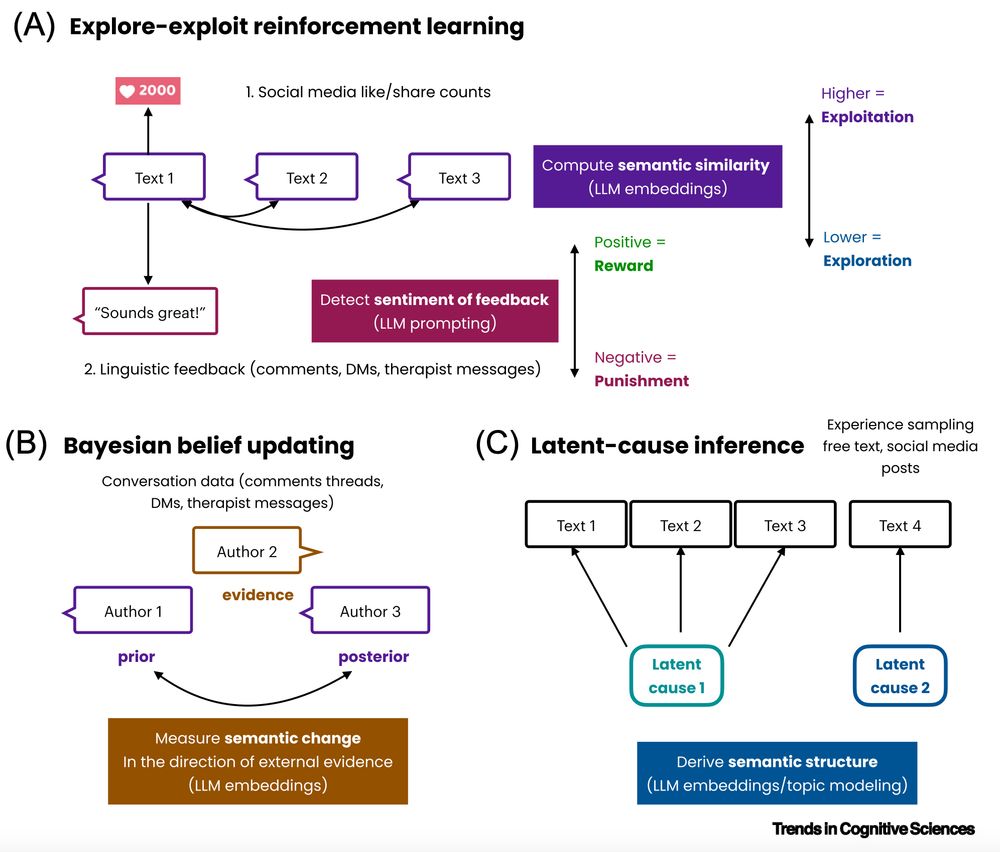Very happy to see our ice-fishing paper on the cover of @science.org this week! 🎣🎉
We tracked large groups of Finnish competitive ice-fishers to study how social foragers use social information when searching for resources. 🐟
Link: www.science.org/doi/10.1126/... (contact me for open access)
30.01.2026 12:36 — 👍 93 🔁 42 💬 4 📌 2

🚨 New preprint 🚨
We present the decisions-from-experience database (DfE-DB), including data from 168 studies.
The data are currently shared with the original authors and made public upon publication.
🔗 Database: github.com/dwulff/dfe-db
🔗 Preprint: www.biorxiv.org/content/10.6...
19.12.2025 10:56 — 👍 23 🔁 9 💬 0 📌 1

Interpretation Issues With the Patient Health Questionnaire Instructions
This survey study assesses whether responses to the Patient Health Questionnaire reflect symptom frequency and severity.
1/n Out today in @jamapsychiatry.com: Interpretation Issues With the Patient Health Questionnaire Instructions. We find troubling variability in whether people think they should respond based on the frequency of the Sx or the frequency of being bothered by the Sx.
jamanetwork.com/journals/jam...
17.12.2025 17:11 — 👍 64 🔁 25 💬 3 📌 5
Our paper on the ☀️ "summer slide" 🛝 is out now @pnas.org!
www.pnas.org/doi/10.1073/...
Summer slide is a replicable phenomenon across diverse datasets that's more than "forgetting" school material in vacation months, but effects of socioeconomic inequality are ➡️ 7x bigger! ⬅️
#PsychSciSky #DevPsy
🧵👇
16.12.2025 17:56 — 👍 125 🔁 51 💬 2 📌 6
Excited to see this out!
20.11.2025 17:06 — 👍 3 🔁 0 💬 0 📌 0

We have a new preprint: osf.io/preprints/so...
What have we learned about social media - the constantly moving target of empirical research - over the past decade?
30.10.2025 10:53 — 👍 84 🔁 39 💬 2 📌 4
Super happy to see this review out! We ask why people are so reluctant to abandon goals and how this commitment could be understood computationally. Work with Jill O'Reilly & @yaelniv.bsky.social
29.10.2025 15:56 — 👍 49 🔁 19 💬 1 📌 1
Interactive Cognition Lab | USC
Interactive Cognition Lab at USC, led by principal investigator, Dr. Nina Rouhani.
I will be recruiting 🌟PhD students🌟 for my newish lab! If you're interested in learning & memory mechanisms applied to individual, interactive & collective behavior using computational modeling, real-world experiments and fMRI, email me! RTs much appreciated 🙏 rouhanilab.com
24.10.2025 16:57 — 👍 92 🔁 79 💬 1 📌 2

Neurocomputational basis of learning when choices simultaneously affect both oneself and others
Nature Communications - When learning to make choices that simultaneously affect the self and others, asymmetric encoding of information guides future social behaviors across mutually beneficial,...
📢 Thrilled to share our paper is out now in @natcomms.nature.com
Shared computations underlie how we acquire actions that are mutually beneficial, instrumentally harmful (benefits self at the expense of others), altruistic (benefit others at the expense of self), or mutually costly
🧵 rdcu.be/eL8mZ
22.10.2025 16:42 — 👍 49 🔁 31 💬 2 📌 1

1/ To explore or to exploit? I’m excited to share my new preprint with @tobiasuhauser.bsky.social and @micahgallen.com, correlating variations in cortical microstructures with individual differences in exploration-exploitation behaviours, using a gamified task! 🧵 www.biorxiv.org/content/10.1...
15.10.2025 11:57 — 👍 24 🔁 11 💬 2 📌 1

Leveling up fun: learning progress, expectations, and success influence enjoyment in video games
Scientific Reports - Leveling up fun: learning progress, expectations, and success influence enjoyment in video games
What influences whether people have fun with a task?
Our paper “Leveling up fun: learning progress, expectations and success influence enjoyment in video games” with @thecharleywu.bsky.social and @ericschulz.bsky.social now in Scientific Reports!
rdcu.be/eI069
Paper summary below 1/4
02.10.2025 09:31 — 👍 58 🔁 16 💬 1 📌 0

Abstract and results summary
🚨 New preprint 🚨
Across 3 experiments (n = 3,285), we found that interacting with sycophantic (or overly agreeable) AI chatbots entrenched attitudes and led to inflated self-perceptions.
Yet, people preferred sycophantic chatbots and viewed them as unbiased!
osf.io/preprints/ps...
Thread 🧵
01.10.2025 15:16 — 👍 171 🔁 88 💬 5 📌 15
I strongly believe modeling behavior will be critical for understanding mental health well enough to develop new interventions, but the gap between task-based and naturalistic behavior is MASSIVE. Some great ideas here for bridging that gap!
30.09.2025 15:28 — 👍 3 🔁 1 💬 0 📌 0
Such an important topic: computational psychiatry at the nexus of lab-based understanding (eg of reinforcement learning and mood) and measures of real-world behavior and mental health conditions.
(Scroll to the bottom for a link open to all).
29.09.2025 20:33 — 👍 14 🔁 1 💬 1 📌 0

📢 My lab at the Mount Sinai School of Medicine is considering graduate student applications this fall
We welcome applicants interested in using computational modeling & fMRI to study social connection
🗓️ Deadline: December 1, 2025
🔗 Learn more: sinclaboratory.com/apply
#comppsychiatry #socialneuro
22.09.2025 18:17 — 👍 18 🔁 16 💬 2 📌 1
Thank you so much for sharing!!
29.09.2025 20:47 — 👍 1 🔁 0 💬 0 📌 0
Fantastic paper by @danmirea.bsky.social ! 👇
26.09.2025 16:55 — 👍 6 🔁 1 💬 1 📌 0
Inspiring work by @danmirea.bsky.social!
26.09.2025 18:40 — 👍 5 🔁 2 💬 1 📌 0
Some to-dos for the field:
- identify amenable types of real-world data
- integrate them into data-collection pipelines alongside lab-based tasks
- assess links to mental health
- assess lab-based versus real-world convergent validity of parameters
- expand models to accommodate real-world data
29.09.2025 15:04 — 👍 5 🔁 0 💬 1 📌 0
…and challenges of this approach:
⚠️ Noisy data
⚠️ Analytical complexity
⚠️ Data collection burden
⚠️ Ethical considerations
It remains to be seen whether real-world data can better computational psychiatry.
29.09.2025 15:04 — 👍 4 🔁 0 💬 1 📌 0

Finally, we explore opportunities:
👍 Testing the generalizability of in-lab computational psychiatry findings to every-day life
👍 Incorporating linguistic behavior into cognitive models using LLMs (see figure)
29.09.2025 15:04 — 👍 2 🔁 0 💬 1 📌 0

We also provide a (non-exhaustive) taxonomy of cognitive processes paired with modeling frameworks and types of real-world data that could be used to probe them:
29.09.2025 15:04 — 👍 3 🔁 0 💬 1 📌 0

We review recent studies that probe cognition using real-world behavior, primarily in a reinforcement learning framework.
Some of these have uncovered novel links to mental health (e.g. linking depression to blunted reactivity to positive prediction errors, or higher sensitivity to social rewards)
29.09.2025 15:04 — 👍 5 🔁 0 💬 1 📌 0
By real-world data we mean any data that reflect a person’s every-day behavior. We distinguish 3 types:
- experience sampling data (active, self-report)
- passive sensing data (e.g. geolocation, physiology, social proximity)
- digital-behavior data (e.g. social media, texting, phone/app navigation)
29.09.2025 15:04 — 👍 5 🔁 0 💬 1 📌 0
Computational psychiatry often relies on behavior in cognitive tasks, which are simpler, less engaging and often less social than real-world environments.
By contrast, real-world data have intrinsic ecological validity and allow the continuous assessment of cognition and its variation over time.
29.09.2025 15:04 — 👍 4 🔁 0 💬 1 📌 0

🚨Out now in @cp-trendscognsci.bsky.social 🚨
We explore the use of cognitive theories/models with real-world data for understanding mental health.
We review emerging studies and discuss challenges and opportunities of this approach.
With @yaelniv.bsky.social and @eriknook.bsky.social
Thread ⬇️
29.09.2025 15:04 — 👍 95 🔁 32 💬 1 📌 4
Thanks so much Angela!
26.09.2025 19:09 — 👍 1 🔁 0 💬 0 📌 0
Thanks for sharing Ondrej!! 🙂
26.09.2025 18:32 — 👍 1 🔁 0 💬 0 📌 0
Postdoc at the Princeton Neuroscience Institute.
Planning in complex environments, RL and network science.
https://www.aekahn.com
I study how people solve big problems with small brains. Starting at Dartmouth in 2026—I'm recruiting!
https://fredcallaway.com
Computational cognitive scientist interested in learning and decision-making in human and machiches
Research director of the Human Reinforcement Learning team
Ecole Normale Supérieure (ENS)
Institut National de la Santé et Recherche Médicale (INSERM)
The official account of Princeton University. In the Nation’s Service and the Service of Humanity.
Scientist / PhD in Progress 👇🏻
📍 UK 🇬🇧 @CambridgeUniversity
🎓 Gates-Cambridge Scholar
🧠 Studying psychology and brains
✉️ hello@emilytowner.com
#psychology #neuroscience #development #learning #brain #adolescence
www.emilytowner.com
Bold science, deep and continuous collaborations.
Cognitive and decision science at MPI for Human Development & Uni Basel | Data science at therbootcamp.github.io | R, language models, and sustainability (text2sdg.io).
Discoveries and developments from the Princeton Neuroscience Institute.
Explore our website 🏠: pni.princeton.edu
Read recent research stories 📰: linktr.ee/princetonneuro
Join our newsletter 📬: http://eepurl.com/iTAKzI
PhD student in statistical neuroscience at Princeton. https://victorgeadah.github.io
assistant prof. Personalized Treatment Lab @uarizona clinical psychology, intervention science. Precision Mental Health/Digital Therapy. Dad+Husband. He/him.
Assistant Professor of Cognitive Neuroscience | UConn Psych Sci | attention, cognition, mental health, development, environment, personalized neuroscience
@acornlab.bsky.social
arielleskeller.wixsite.com/attention
appliedcognitionlab.psychology.uconn.edu
art & architectural historian / visual, material & religious culture
Assistant Prof of Psych at USC | Director of SoCoLab (socolab.org) | social (dis)connection, social perception, mediated social cognition | dog mom 🐶 | Soli Deo gloria
Created by @columbiauniversity.bsky.social to be the world's foremost neuroscience institute, we are deciphering the brain — how it develops, works, endures and recovers.
Executive Director, Princeton Quantum Initiative.
Postdoc @ Princeton AI Lab
Natural and Artificial Minds
Prev: PhD @ Brown, MIT FutureTech
Website: https://annatsv.github.io/
Assistant prof @ Kellogg School of Management, Northwestern University. Studying emotion, morality, social networks, psych of tech. #firstgen college graduate
An independent charity that seeks to fund blue skies research and scholarship. Follow this channel for details on upcoming grant deadlines, published research, scheme opening dates, grant announcements, events, and more. https://www.leverhulme.ac.uk/













